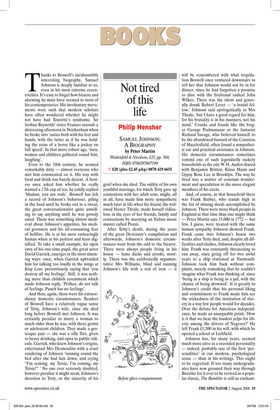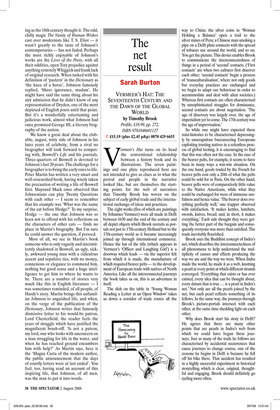Not tired of this life
Philip Hensher
SAMUEL JOHNSON: A BIOGRAPHY by Peter Martin Weidenfeld & Nicolson, £25, pp. 568, ISBN 9780297607199 ✆ £20 (plus £2.45 p&p) 0870 429 6655 Thanks to Boswell’s inexhaustibly interesting biography, Samuel Johnson is deeply familiar to us, even in his most extreme eccentricities. It’s easy to forget how bizarre and alarming he must have seemed to most of his contemporaries. His involuntary movements were such that modern scholars have often wondered whether he might not have had Tourette’s syndrome. Sir Joshua Reynolds’ sister Frances records a distressing afternoon in Twickenham when he broke into ‘antics both with his feet and hands, with the latter as if he was holding the reins of a horse like a jockey on full speed’. In that more robust age, ‘men, women and children gathered round him, laughing’.
Even to the 18th century, he seemed remarkably dirty — almost everyone who met him commented on it. His way with food and drink was barely decent. A hostess once asked him whether he really wanted a 17th cup of tea; he coldly replied ‘Madam, you are rude’. Boswell has left a record of Johnson’s behaviour, piling in the food until he broke out in a sweat, the great conversationalist quite unwilling to say anything until he was grossly sated. There was something almost medieval about Johnson’s appetites, his medical grossness and his all-consuming fear of hellfire. He is at his most endearingly human when at his pettiest and least dignified. To take a small example, his open envy of his one-time pupil, the great actor David Garrick, emerges in the most alarming ways: once, when Garrick upbraided him for talking too loudly in the wings at King Lear, pretentiously saying that ‘you destroy all my feelings’. Still, it was nothing more than childish resentment which made Johnson reply, ‘Prithee, do not talk of feelings. Punch has no feelings’.
And then, again, there were his extraordinary domestic circumstances. Readers of Boswell have a relatively vague sense of Tetty, Johnson’s wife, since she died long before Boswell met Johnson. It was certainly peculiar to marry a woman so much older than he was, with three grown or adolescent children. They made a grotesque pair — she was a silly flirt, given to heavy drinking, and open to public ridicule. Garrick, who knew Johnson’s origins, entertained Mrs Desmoulins with a cruel rendering of Johnson ‘running round the bed after she had lain down, and crying “I’m coming, my Tetsie, I’m coming, my Tetsie!” ’ No one ever seriously doubted, however peculiar it might seem, Johnson’s devotion to Tetty, or the sincerity of his grief when she died. The oddity of his own youthful marriage, for which Tetty gave up connexions with her adult sons, might, all in all, have made him more sympathetic much later in life when his friend, the widowed Hester Thrale, made herself ridiculous in the eyes of her friends, family and connections by marrying an Italian music master called Piozzi.
After Tetty’s death, during the years of the great Dictionary’s compilation and afterwards, Johnson’s domestic circumstances went from the odd to the bizarre. There were always people living in his house — lame ducks and crooks, mostly. There was the celebratedly argumentative Mrs Williams, blind and running Johnson’s life with a rod of iron — it will be remembered with what trepidation Boswell once ventured downstairs to tell her that Johnson would not be in for dinner, since he had forgotten a promise to dine with the firebrand radical John Wilkes. There was the silent and generally drunk Robert Levet — ‘a brutal fellow,’ Johnson said apologetically to Mrs Thrale, ‘but I have a good regard for him, for his brutality is in his manners, not his mind.’ Crooks and frauds like the forger George Psalmanazar or the fantasist Richard Savage, who believed himself to be the abandoned bastard of the Countess of Macclesfield, often found a sympathetic ear and practical assistance in Johnson. His domestic circumstances sometimes remind one of such legendarily rackety households as the one W. H. Auden shared with Benjamin Britten, Klaus Mann and Gypsy Rose Lee in Brooklyn. The way he lived was a matter of constant wonderment and speculation to the more elegant members of his circle.
And, of course, in that household there was Frank Barber, who stands high in the list of shining deeds accomplished by Johnson. There were more black people in England at that time than one might think — Peter Martin says 15,000 in 1772 — but few, I guess, were treated with the same human sympathy Johnson showed Frank. Frank came into Johnson’s house two weeks after Tetty died, and, despite all difficulties and clashes, Johnson clearly loved him. Frank was constantly threatening to run away, once going off for two awful years to a ship stationed at Yarmouth. Johnson took him back without complaint, merely remarking that he couldn’t imagine what Frank was thinking of, since ‘being in a ship is being in a jail, with the chance of being drowned’. It is greatly to Johnson’s credit that his personal liking and commitment to Frank made him see the wickedness of the institution of slavery in a way few people would for decades. Over the debate for American independence, he made an unarguable point: ‘How is it that we hear the loudest yelps for liberty among the drivers of Negroes?’ He left Frank £1,500 in his will, with which he opened a school at Lichfield.
Johnson has, for many years, seemed much more alive as a recorded personality — indeed, probably one of the first ‘personalities’ in our modern, psychological sense — than in his writings. This ought to be regretted. If too many undergraduates have now groaned their way through Rasselas for it ever to be revived as a popular classic, The Rambler is still as enchant ing as the 18th century thought it. The odd, chilly magic The Vanity of Human Wishes cast over modernists like T. S. Eliot — it wasn’t greatly to the taste of Johnson’s contemporaries — has not faded. Perhaps the most richly enjoyable of Johnson’s works are the Lives of the Poets, with all their oddities, open Tory prejudice against anything remotely Whiggish and frank lack of original research. When tasked with his definition of ‘pastern’ in the Dictionary as ‘the knee of a horse’, Johnson famously replied, ‘Sheer ignorance, madam’. He might have said the same thing about his airy admission that he didn’t know of any representation of Dryden, one of the most depicted of English poets until that point. But it’s a wonderfully entertaining and judicious work, almost what Johnson had once promised George III, a literary biography of the nation.
We know a great deal about the clubable, august, witty side of Johnson in his later years of celebrity, from a rival no biographer will look forward to competing with, Boswell’s Life and his journals. Three-quarters of Boswell is devoted to Johnson’s last 20 years. The challenge for a biographer is to bring the early ones to life. Peter Martin has written a very smart and well-researched book, having wisely taken the precaution of writing a life of Boswell first. Maynard Mack once observed that Johnsonians can play Twenty Questions with each other — I seem to remember that his example was ‘What was the name of the cat before Hodge?’ To my surprise, Hodge — the one that Johnson was so keen not to offend with his reflections on the characters of other cats — finds no place in Martin’s biography. But I’m sure he could answer the question, if pressed.
Most of all, we see in Martin’s book someone who is only vaguely and intermittently shadowed in Boswell, an ugly, sickly, awkward young man with a ridiculous accent and repulsive tics, with no money, connexions or elegance to commend him, nothing but good sense and a huge intelligence to get him to where he wants to be. There are a number of stories very much like this in English literature — I was sometimes reminded, of all people, of Hardy’s story. Martin brings this unfamiliar Johnson to anguished life, and when, on the verge of the publication of the Dictionary, Johnson writes that famously dismissive letter to his would-be patron, Lord Chesterfield, the reader feels the years of struggle which have justified the magnificent brush-off. ‘Is not a patron, my lord, one who looks with unconcern on a man struggling for life in the water, and when he has reached ground encumbers him with help?’ As Martin says, here is the ‘Magna Carta of the modern author, the public announcement that the days of courtly letters were at last ended’. You feel, too, having read an account of this inspiring life, that Johnson, of all men, was the man to put it into words.



























































 Previous page
Previous page